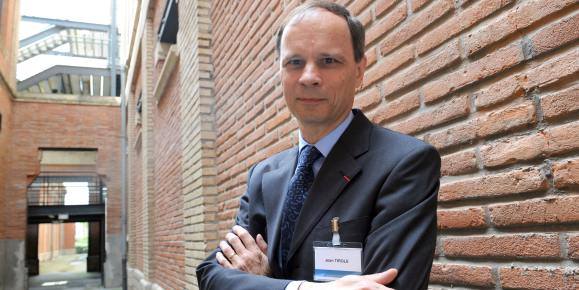Breaking
Frenchman Tirole wins Nobel economics prize
STOCKHOLM — French economist Jean Tirole won the Nobel prize for economics Monday for research on market regulation that has helped policymakers understand how to deal with industries dominated by a few companies.
His work is credited with helping drive the deregulation of industries in developed economies in the 1980s and 1990s, when many sectors were dominated by state-owned companies or monopolies. More recently, however, Tirole has argued for stronger regulation of banks in the wake of the global financial crisis.
“I’m so moved,” the 61-year-old Tirole said, speaking to a news conference in Stockholm on a telephone link from Toulouse.
Tirole, who works at the Toulouse School of Economics in France and has a Ph.D. from Massachusetts Institute of Technology, is the third Frenchman to win the $1.1 million Nobel Memorial Prize in Economic Sciences and the country’s latest international economic star, a role usually reserved for U.S. or British thinkers raised on free-market ideals.
Frenchman Thomas Piketty gained fame with a recent best-seller, “Capital in the 21st Century,” using 300 years of economic data to argue that the gap between rich and poor will only get worse. The book is based on research he worked on with fellow countryman Emmanuel Saez.
The economics was also the second Nobel award captured by Frenchmen this year, with the literature prize last week going to writer Patrick Modiano.
“After Patrick Modiano, another Frenchman in the firmament.
Congratulations to Jean Tirole. A thumb in the eye for french bashing,” French Prime Minister Manuel Valls tweeted.
It was the first economics prize without an American winner since 1999.
Calling Tirole “one of the most influential economists of our time,” the Royal Swedish Academy of Sciences said he’s made contributions in a range of research areas. But it highlighted his role in clarifying “how to understand and regulate industries with a few powerful firms.”
Left unregulated, such industries can produce undesirable results, such as unnecessarily high prices or unproductive companies blocking new firms from entering the market. From the mid-1980s, Tirole “breathed new life into research on such market failures,” the academy said, adding his work has strong bearing on how governments deal with mergers or cartels and how they can regulate industries from telecommunications to banking.
“The unusual thing with Jean Tirole is that he combines great theoretical depth with very detailed knowledge about specific markets and he combines those things into practical policy conclusions,” prize committee member Torsten Persson said. “Politicians would be stupid not to take his policy advice.”
David Warsh, who follows academic economists at his Economic Principals blog, said Tirole’s work helped drive the deregulation since the 1980s. He and other economists exposed the ways that companies could come to capture the government agencies that were supposed to regulate them and use regulation to keep competitors out.
Tirole says the 2008 financial crisis stemmed primarily from regulatory failure.
“The vision according to which economists have unlimited trust in the efficiency of markets is 30 years behind the times,” he told the financial journal Les Echos. He noted that his research “does not advocate necessarily more or less of the state, but rather better state intervention.”
In an interview with France-Info radio on Monday, Tirole said his work applied theories derived from game theory to industry.
“The idea is to give companies the analytical means to deal with new contexts and also to give regulators the analytical tools they need,” he said. “For example, how to deregulate electricity or railroads without creating infrastructure problems. How to allow entrants who are perhaps more dynamic without expropriating from the companies already in place.”
Harvard University professor and economist Philippe Aghion said on France’s BFM television Monday that Tirole’s work is particularly useful to governments as they try to determine the best level of regulation, notably of banks after the global financial crisis. “Tirole is at the frontier of this domain,” Aghion said.
Before Tirole, the academy said, policy-makers advocated simple rules including capping prices for companies with a monopoly and banning cooperation between competitors. Tirole showed that in some circumstances, such rules can do more harm than good.
“His contribution is that he has given us a whole toolbox,” said Persson of the prize committee. “More than that, he has given us an instruction manual for what tool to use in what market.”
Last year, the economics prize went to three Americans — Eugene Fama, Lars Peter Hansen, and Robert Shiller — who shed light on the forces that move stock, bond and home prices.
Monday’s prize completes the 2014 Nobel Prize announcements.
In prizes awarded last week, Taliban attack survivor Malala Yousafzai, 17, became the youngest Nobel winner ever as she and Kailash Satyarthi of India won the peace prize for fighting for children’s rights. Frenchman Modiano won the literature prize for his lifelong study of the Nazi occupation and its effect on his country.
U.S. researchers Eric Betzig and William Moerner and Stefan Hell of Germany shared the chemistry prize for finding ways to make microscopes more powerful than previously thought possible; while Isamu Akasaki and Hiroshi Amano of Japan and Japanese-born U.S. scientist Shuji Nakamura won the physics prize for the invention of blue light-emitting diodes used in mobile phones, computers and TVs.
U.S.-British scientist John O’Keefe split the Nobel Prize in medicine with Norwegian couple May-Britt Moser and Edvard Moser for breakthroughs in brain cell research that could pave the way for a better understanding of diseases like Alzheimer’s.
The awards will be presented on Dec. 10, the anniversary of prize founder Alfred Nobel’s death in 1896.
Even though the economics award is not an original Nobel Prize — it was added in 1968 by Sweden’s central bank — it is presented with the others and carries the same prize money.
Lori Hinnant in Paris and Paul Wiseman in Washington contributed to this report.






















